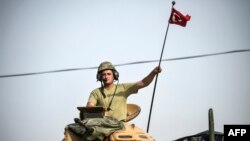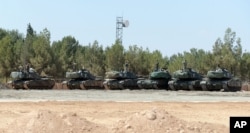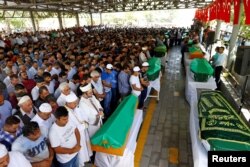As Turkey claimed to have succeeded in eradicating IS from the last strip the group controlled along its border with Syria, critics question Turkey's real intent behind the operation.
Turkish tanks entered northern Syria on August 24 to start the Jarabulus offensive, code-named "Operation Euphrates Shield" by Turkey.
"Turkey's incursion into Syrian territory is part of a larger effort to fight not only the Islamic State, but also Kurdish forces in northern Syria," Turkish President Recep Tayyip Erdogan said.
"The operation started in the north of Syria against terror groups which constantly threaten our country, like [IS] and the PYD," Erdogan stated, referring to the acronym of the Democratic Union Party in northern Syria.
But some analysts say the only purpose of this operation is to attack the PYD for its links with the PKK, or Kurdistan Workers' Party. Turkey, the EU and the U.S. consider the PKK a terrorist organization that has waged a three-decade insurgency.
Faysal Dagli, an Istanbul-based political analyst and author, told VOA that instead of attacking IS, the Turkish government is actually extending its support to the group to fight Kurds.
"IS uses Turkey as a logistic center where its militants gather, get medical treatment and transfer to Syria,” Dagli said. “So, Turkey must have some expectations from that. The IS has been attacking Kurds on the Syrian border, and Turkey tolerates these attacks." He said Ankara must give up its policy of supporting IS against the Kurds.
Threats within Turkey
Attacks inside Turkey in recent months, including the one on its major airport in Istanbul in June of this year that killed 41 people, have been blamed on IS and prove the group's strong presence inside the country.
Eren Erdem, an MP of Istanbul from the Republican People's Party (CHP), the main opposition party in Turkey's parliament, in an interview with VOA echoed what Dagli said.
"When there are so many IS militants in Turkey, what is the point of supposedly targeting IS in Syria?” Erdem said. “Of course, IS must be destroyed everywhere across the world including in Syria, but the Turkish government should first deal with the IS members in Turkey. Those in an IS cell house in Ankara have recently been released after getting detained. So I should say that I find the Jarabulus operation of the government insincere."
But the government says it also faces an IS danger from across the border. The Turkish operation inside Syria started after a suicide bombing on August 20 in the southeastern city of Gaziantep, near the Syrian border, that killed 54 people at a Kurdish wedding celebration. Turkey blamed the attack on IS.
Turkish Foreign Minister Mevlut Cavusoglu said, "Our border must be completely cleansed of Daesh." Daesh is the Arabic acronym for Islamic State.
The opposition parties, as well as community leaders and activists of religious minorities, tell VOA that IS militants inside Turkey pose an enormous threat to public security, and that Turkey should urgently focus on their activities within the country.
Milliyet, a Turkish newspaper, recently reported that a 5-story building in Ankara was rented by IS members. Thirty children whose ages range from 9 to 17 were given training by the militants in the building, which was turned into a boarding school of IS.
Another paper, Hurriyet, reported on August 23 that IS had selected at least 26 targets in 18 Turkish cities for future attacks.











